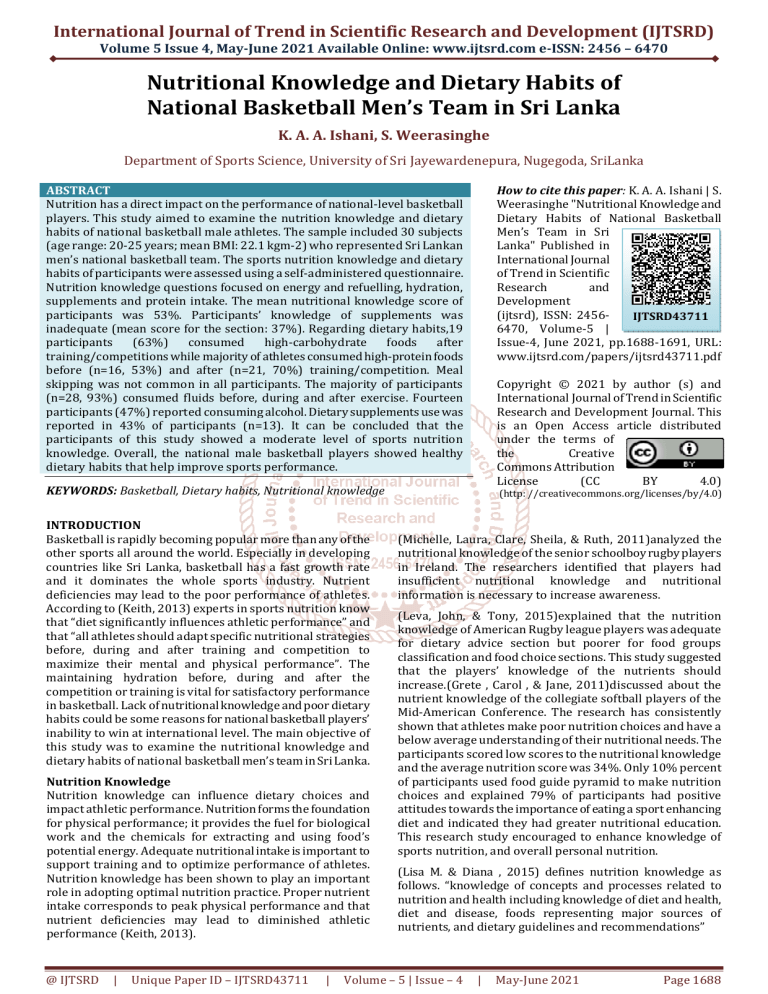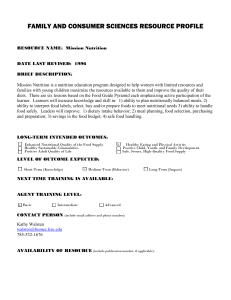
International Journal of Trend in Scientific Research and Development (IJTSRD)
Volume 5 Issue 4, May-June 2021 Available Online: www.ijtsrd.com e-ISSN: 2456 – 6470
Nutritional Knowledge and Dietary Habits of
National Basketball Men’s Team in Sri Lanka
K. A. A. Ishani, S. Weerasinghe
Department of Sports Science, University of Sri Jayewardenepura, Nugegoda, SriLanka
ABSTRACT
Nutrition has a direct impact on the performance of national-level basketball
players. This study aimed to examine the nutrition knowledge and dietary
habits of national basketball male athletes. The sample included 30 subjects
(age range: 20-25 years; mean BMI: 22.1 kgm-2) who represented Sri Lankan
men’s national basketball team. The sports nutrition knowledge and dietary
habits of participants were assessed using a self-administered questionnaire.
Nutrition knowledge questions focused on energy and refuelling, hydration,
supplements and protein intake. The mean nutritional knowledge score of
participants was 53%. Participants’ knowledge of supplements was
inadequate (mean score for the section: 37%). Regarding dietary habits,19
participants
(63%)
consumed
high-carbohydrate
foods
after
training/competitions while majority of athletes consumed high-protein foods
before (n=16, 53%) and after (n=21, 70%) training/competition. Meal
skipping was not common in all participants. The majority of participants
(n=28, 93%) consumed fluids before, during and after exercise. Fourteen
participants (47%) reported consuming alcohol. Dietary supplements use was
reported in 43% of participants (n=13). It can be concluded that the
participants of this study showed a moderate level of sports nutrition
knowledge. Overall, the national male basketball players showed healthy
dietary habits that help improve sports performance.
How to cite this paper: K. A. A. Ishani | S.
Weerasinghe "Nutritional Knowledge and
Dietary Habits of National Basketball
Men’s Team in Sri
Lanka" Published in
International Journal
of Trend in Scientific
Research
and
Development
(ijtsrd), ISSN: 2456IJTSRD43711
6470, Volume-5 |
Issue-4, June 2021, pp.1688-1691, URL:
www.ijtsrd.com/papers/ijtsrd43711.pdf
KEYWORDS: Basketball, Dietary habits, Nutritional knowledge
(http: //creativecommons.org/licenses/by/4.0)
INTRODUCTION
Basketball is rapidly becoming popular more than any of the
other sports all around the world. Especially in developing
countries like Sri Lanka, basketball has a fast growth rate
and it dominates the whole sports industry. Nutrient
deficiencies may lead to the poor performance of athletes.
According to (Keith, 2013) experts in sports nutrition know
that “diet significantly influences athletic performance” and
that “all athletes should adapt specific nutritional strategies
before, during and after training and competition to
maximize their mental and physical performance”. The
maintaining hydration before, during and after the
competition or training is vital for satisfactory performance
in basketball. Lack of nutritional knowledge and poor dietary
habits could be some reasons for national basketball players’
inability to win at international level. The main objective of
this study was to examine the nutritional knowledge and
dietary habits of national basketball men’s team in Sri Lanka.
Nutrition Knowledge
Nutrition knowledge can influence dietary choices and
impact athletic performance. Nutrition forms the foundation
for physical performance; it provides the fuel for biological
work and the chemicals for extracting and using food’s
potential energy. Adequate nutritional intake is important to
support training and to optimize performance of athletes.
Nutrition knowledge has been shown to play an important
role in adopting optimal nutrition practice. Proper nutrient
intake corresponds to peak physical performance and that
nutrient deficiencies may lead to diminished athletic
performance (Keith, 2013).
@ IJTSRD
|
Unique Paper ID – IJTSRD43711
|
Copyright © 2021 by author (s) and
International Journal of Trend in Scientific
Research and Development Journal. This
is an Open Access article distributed
under the terms of
the
Creative
Commons Attribution
License
(CC
BY
4.0)
(Michelle, Laura, Clare, Sheila, & Ruth, 2011)analyzed the
nutritional knowledge of the senior schoolboy rugby players
in Ireland. The researchers identified that players had
insufficient nutritional knowledge and nutritional
information is necessary to increase awareness.
(Leva, John, & Tony, 2015)explained that the nutrition
knowledge of American Rugby league players was adequate
for dietary advice section but poorer for food groups
classification and food choice sections. This study suggested
that the players’ knowledge of the nutrients should
increase.(Grete , Carol , & Jane, 2011)discussed about the
nutrient knowledge of the collegiate softball players of the
Mid-American Conference. The research has consistently
shown that athletes make poor nutrition choices and have a
below average understanding of their nutritional needs. The
participants scored low scores to the nutritional knowledge
and the average nutrition score was 34%. Only 10% percent
of participants used food guide pyramid to make nutrition
choices and explained 79% of participants had positive
attitudes towards the importance of eating a sport enhancing
diet and indicated they had greater nutritional education.
This research study encouraged to enhance knowledge of
sports nutrition, and overall personal nutrition.
(Lisa M. & Diana , 2015) defines nutrition knowledge as
follows. “knowledge of concepts and processes related to
nutrition and health including knowledge of diet and health,
diet and disease, foods representing major sources of
nutrients, and dietary guidelines and recommendations”
Volume – 5 | Issue – 4
|
May-June 2021
Page 1688
International Journal of Trend in Scientific Research and Development (IJTSRD) @ www.ijtsrd.com eISSN: 2456-6470
Dietary Habits
Athletes in general have special nutrient needs due to the
additional demands of training and competition. Therefore,
appropriate food intake to maintain good nutritional status
is essential for athletes who exercise regularly. This includes
proper meals at pre-training, during the training and posttraining periods. According to, there are certain goals that
need to be achieved to enhance sustained performance (D. ,
N. , V., B. , & L., 1996).
In Sri Lanka, there is little information on the food habits and
nutritional status of athletes. In basketball, there is no
significant evidence to understand about the food habits,
attitudes and behaviors of the players.
(Jimaima , Subramaniam, & Ketan , 2010) studied about the
food habits and the nutritional status of the Fiji rugby
players. This research study explained that rugby players
had low level of attitude towards the nutrition and suggested
to increase the awareness of the carbohydrate diet intake. It
would be important for the sports players and thus boost
energy supply during the competition.
Problem Statement
Sri Lanka national men’s basketball team is receiving
relatively less recognition and achievements in the
international arena, and this is probably due to several
deficiencies in training and other factors. Not having proper
body composition relevant to the type of sport and playing
position, inadequate dietary intake, inappropriate attitudes
and behaviors, inadequate nutrition knowledge could be
some reasons for not reaching international achievements.
Plenty of evidence is there to suggest that low energy
availability may lead to the injuries, therefore the
performance level of the basketball players is usually getting
decreased. In order to maximize performance, basketball
players should possess a good understanding on how the
performance depends on each variable properly.
Though many researches have been conducted on how the
nutritional knowledge, dietary habits towards the nutrient
affects the athlete’s performance in other sports, there are
few that relate to the basketball, especially for national
men’s team in Sri Lanka. Though some researches have been
conducted, findings are not enough to have a clear
understanding and predict the present players’ knowledge
about nutrient and dietary habits that are dynamic in
basketball. This research will help to improving the quality
of the players to reach internationally-recognized standards
with the limited resources available in Sri Lanka. Especially
in Sri Lanka there may be huge changes in the player’s
performance due to the development that is going on. Thus,
it is more essential to collect new knowledge on how
national men’s basketball players respond to the nutritional
knowledge, dietary habits.
men’s basketball players selected from the national
basketball ranking system of Sri Lanka.
The questionnaire contained 02 demographic questions
including, age and playing position.
The data was gathered by using a standard questionnaire
(Michelle, Laura, Clare, Sheila, & Ruth, 2011)to gather
information on nutritional knowledge and of national
basketball men’s team in Sri Lanka. The questionnaire
consisted of 32 questions categorized into five sections:
position of play and training schedules, dietary and
hydration practices, dietary habits toward nutrition and
hydration, nutrition knowledge, and sources of nutritional
information. Closed single-answer questions were
predominantly used in all five sections. A 4-point Likert scale
was used in the evaluation of nutritional attitudes in two
questions.
The questionnaire was distributed among the participants
through social media as a Google form.
Data Analysis
For the demographic data that collected from questionnaire
(such as age and playing position) present by bar charts and
pie charts by using Microsoft excel sheet.
Data are expressed as frequencies and percentages.
Results and Discussion
According to the data analysis, the national men’s basketball
team is consisting 17% of centers, shooting guards and
power forwards, another 23% of small forwards and 26% of
point guards. Altogether, most of the players were in above 25
age range and only 3 players reported in 20-21 age range. The
participants spend 9.53% of average hours per week with
swimming, pitch and fitness activities.
Table1showsthereliabilitystatisticsofallstudyvariables.All
data exceed Cronbach’s Alpha level more than
0.7andtheyareintheacceptablerange.
Table 1 Reliability Statistics
Cronbach’sAlpha No: of Items
0.705
30
This study explained that players have a moderate level of
nutrition knowledge (mean percent score was 53.3%). The
nutrition knowledge scores focusing four areas (protein
intake, supplements, hydration, energy and refueling) are
summarized in Figure 1.
Therefore, this study examines “nutritional knowledge and
dietary habits of national basketball men’s team in Sri
Lanka”.
Accordingly, the main objective of the study is to determine
the nutritional knowledge and dietary habits of national
basketball men’s team in Sri Lanka.
Methodology
The study was conducted as a case study to examine the
nutritional knowledge and dietary habits of national
basketball players on nutrition. The sample was 30 national
@ IJTSRD
|
Unique Paper ID – IJTSRD43711
|
Figure 1: Mean Knowledge scores of National
Basketball Men s’ players
The participants scored above 50% for areas related to
proteins, hydration and energy and refueling, suggesting that
Volume – 5 | Issue – 4
|
May-June 2021
Page 1689
International Journal of Trend in Scientific Research and Development (IJTSRD) @ www.ijtsrd.com eISSN: 2456-6470
they have an adequate knowledge on these areas. However,
The pattern of the food and fluid consumption and dietary
the participants’ knowledge of dietary supplements was
habits of the participants is presented in Table 2.
inadequate (mean score was 36.6%).
Table 2 The dietary habits of participants (N =30)
Dietary Practices / Habits
Frequency (%)
Consuming a high-protein diet
Before the competition
16
53
After competition
21
70
Consuming a high-carbohydrate diet
Before the competition
15
50
After competition
19
63
Water consumption
Before
24
80
During
27
90
After
24
80
Sports Drinks
Before
1
3
During
1
3
After
5
17
Supplements usage
Protein
11
37
Vitamins and Minerals
11
37
Creatine
4
13
Other
3
10
Alcohol Usage
Yes
14
46.7
No
16
53.3
Consumption of food before a match/training
Within the 1hour before
11
36.7
< 1 hour before
19
63.3
Consumption of food after a match/training
Within 30 minutes
13
43.3
< 30 minutes after
17
56.7
Nearly half of the players have consumed high protein and
carbohydrate diet before and after the competition. The
hydration practices were satisfactory, with 80-90% of players
consuming water before, during and after the match or
training. According to Table 2, only few players have
consumed sports drinks. Supplement usage demonstrated
equal proportions of participants consuming proteins and
vitamin/mineral supplements. The majority of players
consumed food more than 1 hours before a match or training,
although players did not consume food within the first 30
minutes after a match or training.
According to results of the study, the majority of players had
sufficient knowledge of protein, and their dietary practices
regarding proteins were also satisfactory as shown in Table 2.
In sports like basketball in which exercise lasts longer than
one-hour, additional carbohydrates are needed to maintain a
favorable blood glucose level and to reduce utilization of
protein as an energy source (Louise, Bente, & John, 2004).
The national basketball players in the current study
demonstrated a moderate knowledge level about energy
substrates and refueling practices and in parallel to their
knowledge, their dietary practices regarding carbohydrate
were also acceptable.
Similarly, most of the players consumed water throughout
competitions/training. The participants’ knowledge on
hydration could be a reason for this healthy habit of
consuming adequate amounts of water. However, although
most of the players were aware that sports drinks should be
consumed during exercise lasting more than one hour, only
@ IJTSRD
|
Unique Paper ID – IJTSRD43711
|
3% of players consumed sports drinks during the period of
match or training.
The widespread use of dietary supplements among national
basketball men players was confirmed in this study. The
most common dietary supplement used by players were
protein, vitamins and minerals. However, the overall
knowledge of supplement was inadequate.
Carbohydrates refueling immediately after the match or
training is important because of glycogen storages are
replenished efficiently within 30 minutes after exercise or
training (Louise, Bente, & John, 2004) but 56.7% of players
did not consume food immediately after exercises,
irrespective of their moderate level of knowledge on
refuelling.
Conclusion
Nutrition knowledge can influence dietary choices, dietary
practices and impact on athletic performance. It can be
concluded that the players participated in this study showed
a moderate level of nutritional knowledge. On average,
players showed positive dietary habits except consumption
of food within 30 minutes. Improved nutritional knowledge
could be beneficial for practicing healthy food habits and
improving performance, hence increasing athletes’
nutritional knowledge through awareness programmes is
recommended.
To minimized and overcome the negative issues, the
researcher recommends following solutions and suggestions
for increase the perceived performance of the national
Volume – 5 | Issue – 4
|
May-June 2021
Page 1690
International Journal of Trend in Scientific Research and Development (IJTSRD) @ www.ijtsrd.com eISSN: 2456-6470
lysis_for_Maintenance_Management_in_Complex_Hos
pitals/links/5475b89b0cf29afed612b202/A-NewFailure-Analysis-for-Maintenance-Management-inComplex-Hospitals.pdf
basketball players through gaining proper nutritional
knowledge and dietary habits.
follow a proper diet plan that recommended by the
nutritionist or a proper dietician.
A program can conduct throughout the national players
both in men and women and can increase the awareness
about nutritional knowledge and dietary choices.
Recommendations for further studies
For identify the influence of the nutritional knowledge
towards the players’ performance, the researcher
recommended to undertake future researches with covering
a wider sample area by engaging both national men, women
players and coaches. Furthermore, the researcher
recommended to analyze athletes’ body composition, macro
and micro-nutritional intakes.
References
[1] D. , G., N. , S., V., B., B. , C., & L., J. B. (1996). Nutritional
knowledge, beliefs and behaviours in teenage school
students. Health Education Research, 11(2), 187-204.
doi:https://doi.org/10.1093/her/11.2.187
[2]
Grete , R. H., Carol , A. F., & Jane, E. E. (2011). Nutrition
Knowledge, Practices, Attitudes, and Information
Sources of Mid-American Conference College Softball
Players. Food and Nutrition Sciences, 2(2), 4.
doi:DOI:10.4236/fns.2011.22015
[3]
Jimaima , L., Subramaniam, S., & Ketan , C. (2010).
Food Habits and Nutritional Status of Fiji Rugby
Players. World Academy of Science, Engineering and
Technology,
752-757.
Retrieved
from
https://www.researchgate.net/profile/ErnestoIadanza/publication/236343982_A_New_Failure_Ana
@ IJTSRD
|
Unique Paper ID – IJTSRD43711
|
[4]
Keith, B. (2013). Nutrition & Recovery Needs of the
Basketball Athlete. Gatorate Sports Science Institute,
2-48.
Retrieved
from
https://www.gssiweb.org/docs/defaultsource/default-document-library/bball-task-forcefinal88EF51B080A9.pdf?sfvrsn=2#page=29
[5]
Leva, A., John, L. P., & Tony, A. (2015). Nutritional
knowledge and eating habits of professional rugby
league players: does knowledge translate into
practice? Journal of the International Society of Sports
Nutrition, 12-18. doi:DOI 10.1186/s12970-015-0082y
[6]
Lisa M., S. M., & Diana , L. C. (2015, September). The
effects of nutrition knowledge on food label use. A
review of the literature. Science Direct, 92, 207-216.
doi:https://doi.org/10.1016/j.appet.2015.05.029
[7]
Louise, M. B., Bente, K., & John, L. L. (2004).
Carbohydrates and fat for training and recovery.
Journal of Sports Science, 22(1), 15-30.
doi:https://doi.org/10.1080/026404103100014052
7
[8]
Michelle, W., Laura, C., Clare, C., Sheila, S., & Ruth, W.
M. (2011). The Body Composition, Nutritional
Knowledge, Attitudes, Behaviors, and Future
Education Needs of Senior Schoolboy Rugby Players
in Ireland. International Journal of Sport Nutrition and
Exercise
Metabolism,
21(5),
365-376.
doi:https://doi.org/10.1123/ijsnem.21.5.365
Volume – 5 | Issue – 4
|
May-June 2021
Page 1691


